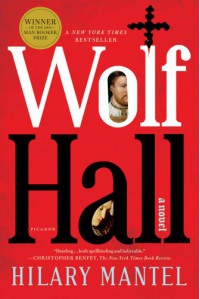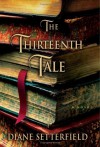Wolf Hall (Thomas Cromwell, #1)

Climbing this book was like reading a mountain. (Wait, what?) I am exhausted, yet fulfilled. I’m also feeling a bit out my depth.
Ever since I finished my Master’s degree two years ago, I haven’t read that many CAPITAL L ‘Literature’ books, mostly out of what you might call ‘avoidance.’ So I’m a bit out of practice in writing anything that isn’t based off of things my hindbrain spews up out of reflex, and I’m definitely out of practice digesting and processing prose that is in any way not designed to deliver pleasure directly to my frontal lobe. So forgive me, please, for not being able to write about this book in a way that would match its own quality, which, by the way, was excellent.
Hilary Mantel’s Booker Award winning Wolf Hall, the first in her Thomas Cromwell trilogy — which continues in last year’s Bring Up the Bodies and will conclude in 2015 with The Mirror and the Light – chronicles the rise of Thomas Cromwell from a poverty-stricken violent son of a drunken blacksmith to the personal advisor to Henry VIII.
I will admit up front that before reading this book, my knowledge of Tudor England was on the limited side, most of my it consisting of what I’d gleaned from listening to “I’m Henery the Eighth, I Am” and from reading Hark! A Vagrant, along with wherever else I might have soaked up the occasional tidbit of general knowledge (as a rule, most American children have absolutely no idea what the hell is going on with the history of the English monarchy, excepting to know it was good old King George who fought us in the Revolutionary War, and some king named James wrote the Bible — and we’re lucky if they know even that). I’d heard the name Thomas Cromwell, but I had no idea that he’s generally considered somewhat of a dick, historically speaking, and I still wouldn’t know if it this book were my only source of information.
Certainly you come away from this book with a pretty good idea of the goings on surrounding Henry’s quest for a male heir (and the sometimes surprising motivations behind it) — the annulment of his marriage to Queen Catherine, the disinheriting of his daughter Mary, making himself the head of the Church in England, and the resulting split from the Catholic Church (and all that mess entailed), and of course, his marriage to Anne Boleyn (and the birth of the future Queen Elizabeth, not that anyone in this book regards her of any worth at all — Mantel even has characters referring to her regularly as ‘The Ginger Pig’). But the real focus is Thomas Cromwell, both the private and the public man. We spend just as much time getting to know Thomas’s family as we do with the King’s affairs (and Cardinal Wolsey’s before that).
Reading this book is sort of a master class in prose and characterization. Everything is tight and focused, not a word wasted, not a scene in the book that wasn’t carefully thought out and planned for. Her dialogue jumps off the page (well, this is accurate for the first 175 pages at least, at which point I was forced to return the book to the library, waited six months, and then checked it out on audiobook instead), and within minutes of a new character speaking, you have a good idea of who they are and what they want.
The majority of the book, however, is written in an extremely close third person, which I’d never seen done before, and which was honestly pretty jarring until I got used to it (which happened within about 15 pages). Everything is from Cromwell’s point of view, but there is no ‘I’ to be found. It’s ‘he’ all the way, with the occasional ‘He, Cromwell,’ thrown in as a distinguisher. We are privy to Cromwell’s inner thoughts and reflections without him having to actually tell us anything — we’re like the world’s most stealthy voyeurs. In this way, Mantel moves us from Cromwell’s troubled childhood (largely skipping over the bit where he was educated and escaped his initial circumstances), to the final years of Cardinal Wolsey’s reign as Henry’s chief advisor, and Thomas’s gradual ascent to take his place, finally ending with the execution of Cromwell’s chief rival, Sir Thomas More, whom history has built up as a martyr, but who Mantel portrays as a sadistic zealot. Mantel’s Cromwell is a hard man, make no mistake, but he’s also a man who loved his wife, who felt loyalty to those he owed it to, and who collects abandoned children and dogs with an affection that is startling when contrasted with his political and professional actions.
My only complaint is that Mantel’s style has no narrative through-line. Scene by scene, incident by incident, she builds up a historically personal patchwork for Cromwell, which leaves the reader to do the work of inferring how once incident led to another. This isn’t all that hard to do, if you’re paying attention, but it does make it a lot harder to see the larger point of the story. (And, yes, I would have liked maybe even just a little bit more evidence of cause and effect from one event to another.) If I had to guess, I’d say it has something to do with the titular Wolf Hall, a place which we don’t even visit in the novel, and which we are told is where the characters are headed as it closes. So if I had to guess, I’d say that Wolf Hall isn’t only a physical destination (the home of the Seymour family), but a metaphorical one as well. All these actions committed by Henry and Cromwell, all those lives ruined in the sake of a cause, only to find out it was basically all for naught (and as I know from boning up on my history after finishing the novel), that Henry will soon cast aside the precious Boleyn to try again with Jane Seymour, that it’s some sort of never ending cycle or rising and falling and greed and power and trying to get what you want. ‘Homo homini lupis,’ man is wolf to man — Cromwell quotes this briefly, and it seems to be the only hard and fixed rule in the world he lives in.
But again, those are only guesses, and it bothers me that I don’t know for sure. Stupid capital ‘L’ Literature.
I’ll definitely be checking out books two and three, which chronicle the fall of Anne Boleyn and the fall of Cromwell himself, respectively. But it will probably be awhile. Gotta rest the old noggin before it climbs its next mountain.
 1
1




